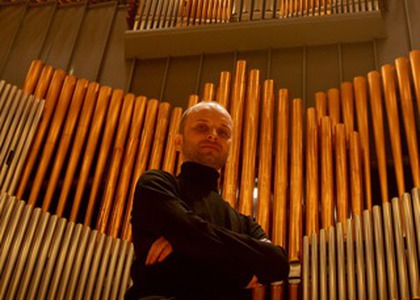> [Archived] Interviews

Interview with organist Eduard Antal
Eduard Antal, the concert you will perform this Sunday at the Radio Hall ends the musical tour through our country entitled "Orgile Românei", now in its 5th edition. The tour is extended abroad with a concert in the Organ Hall in Chișinău on 26th October. How did the "Orgile României" project start?
The national tour "Orgile României" is an initiative to discover instruments from our country and to present to the public a range of repertoires and composers who might otherwise not be as well known.
What was new in the fifth edition of the tour?
The novelties of this year's edition are the inauguration of the baroque instrument in Bistrita and the concert at the Radio Hall on the largest organ in south-eastern Europe. Another novelty is the concert at the organ hall in Chișinău.
If you could tell us how you put together the tour programme...
The process behind the preparation of such a project starts mainly from researching, identifying and deciding the instruments where we want to play. Then, depending on these instruments, we think very carefully about the repertoire that would suit them; because, in general, when we refer to the organ, we mean a highly individual, personal, unique instrument. And when we are talking about ten concerts on ten different instruments, it becomes difficult to find a common denominator that fits all these instruments in terms of repertoire. But there is more than enough time to think about all these aspects.
How did you put together the extremely varied musical programme for the concert at the Radio Hall, which includes, for example, Johann Sebastian Bach's well-known "Toccata in D minor", as well as an adaptation of a piece by Queen?
Because we are talking about an impressive instrument, that of the Radio Hall, we sought to present a diversity of repertoire perspectives. We'll start with Johann Sebastian Bach's famous Toccata and Fugue in D minor, we'll insert sacred organ works, there will be an organ transcription of Rahmaninov's Vocalise (this year is Rahmaninov's anniversary year). And in order to showcase the versatility and expressive as well as technical possibilities of the organ, we have chosen to end the evening's programme with another organ transcription, but this time from the world of rock music - "Bohemian Rhapsody" by the English band Queen.
How did this exploration of organs in our country feel for you as a musician?
Discovering each individual instrument is a special universe because, as I mentioned before, each organ has its own particularities. No two organs are identical, even if we are talking about the same builder. However, the time I spend on a new instrument only helps me to grow as a musician, to acquire artistic maturity and facilitates an insight into the universe of each maker. We're talking 5 editions, over 30 instruments, different makers, different eras... all this diversity only helps me to grow, develop and discover new things, places and people.
Photo credit: Zvasile Adrian
Translated by Vlad-Cristian Dinu,
University of Bucharest, Faculty of Foreign Languages and Literatures, MTTLC, year I
Corrected by Silvia Petrescu














